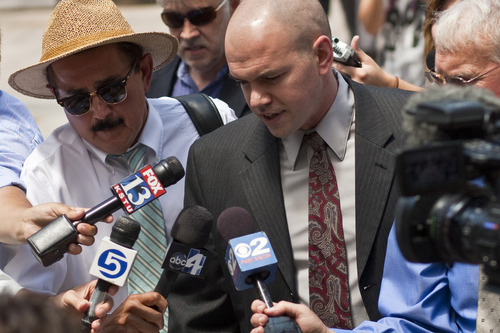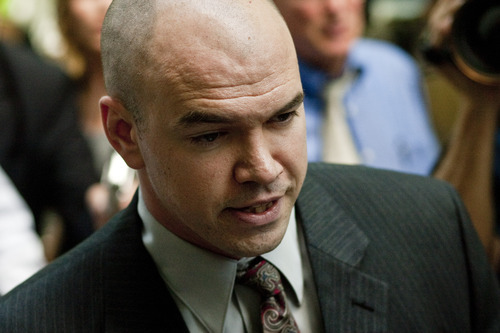This is an archived article that was published on sltrib.com in 2011, and information in the article may be outdated. It is provided only for personal research purposes and may not be reprinted.
Convicted oil and gas lease auction saboteur Tim DeChristopher will appeal his conviction and two-year prison sentence, in part because he was prevented from arguing the environmental necessity of his actions at trial.
Defense attorney Pat Shea said his team will file documents Thursday notifying the court that DeChristopher plans to appeal.
That gives DeChristopher's lawyers two weeks to craft their reasons for appealing both the conviction and the sentence. Those reasons, Shea said, will concentrate on U.S. District Judge Dee Benson's decision not to let DeChristopher argue that he had to act to save future generations from climate change.
"We believe we should have been able to explain to the jury that they did have the right to decide guilt or innocence," Shea said, "on the broader sense of justice."
Benson declined to allow the so-called "necessity" defense at trial, which would have allowed DeChristopher's attorneys to ask jurors to overlook any alleged crimes because they were needed both to prevent environmental harm and to stop an illegal auction.
The federal oil and gas lease auction DeChristopher disrupted came during the closing days of the Bush administration in December 2008. The leases didn't stand: A federal judge issued a restraining order, and the Obama administration pulled the leases citing insufficient environmental reviews.
Benson, in explaining his sentence, made it clear that he believed it was not DeChristopher who set that questioning in motion, but a lawsuit filed by other environmentalists.
University of Utah law professor Daniel Medwed, a criminal law specialist, said it would be difficult to convince the 10th Circuit Court of Appeals to overturn Benson's rejection of the "necessity" — or "lesser-of-two-evils" — defense. That's because a defendant must prove he or she prevented significant harm.
That effort is made even more difficult, he said, because other legal means such as a lawsuit and a presidential election apparently prevented whatever harm one might argue the auction threatened.
"How can he really show that if he hadn't done this, something bad would have happened?" Medwed asked.
Most people seem to want to give defendants the right to make any defense they want, he said, but judges often take on a referee's role in determining what's relevant. It's difficult to convince appeals courts that a judge abused that discretion, he said.
The defense also will appeal the two-year sentence. Although Medwed said two years seems harsh and came as a surprise to him; the maximum Benson could have given was 10 years.
"Excessive sentence claims are pretty tough to win on appeal," he said, "especially in cases where the judge didn't give at or near the maximum."
The appeal also will note, among other things, that Benson did not allow the defense to argue that prosecutors went after DeChristopher selectively, for political reasons. Attorneys had hoped to tell jurors how energy companies in the past had bid on leases without paying, but were never prosecuted, Shea said.
Prosecutors in the Salt Lake City U.S. Attorney's Office declined to comment Wednesday.
DeChristopher's speech
O A transcript of DeChristopher's speech to U.S. District Judge Dee Benson — as published on the website of environmental group Peaceful Uprising — is available online at http://tinyurl.com/3ea664q





